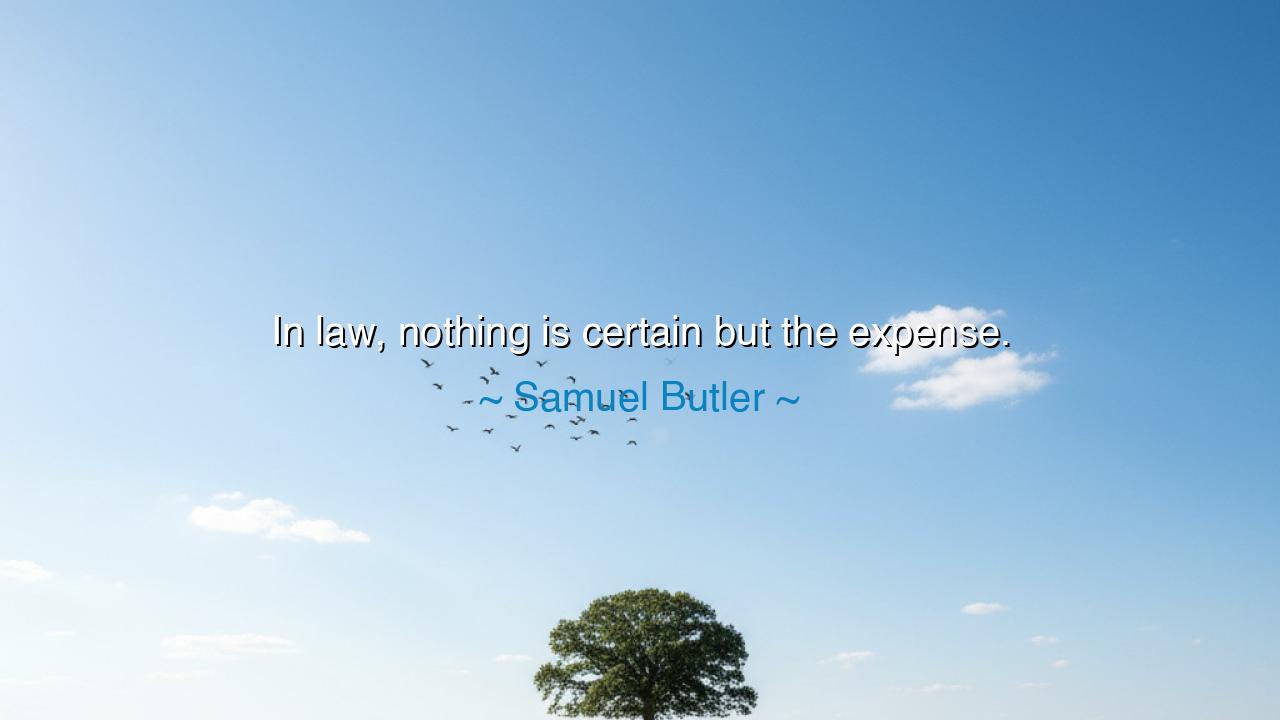
In law, nothing is certain but the expense.






Hear the sharp and bitter truth spoken by Samuel Butler: “In law, nothing is certain but the expense.” These words carry the weight of centuries, for men and women who sought justice have often found themselves drained not of pride alone, but of gold, time, and peace of mind. Butler, a satirist of the seventeenth century, cast his wit like a blade against the pomp and folly of his age, and here he turned it upon the courts of law. He observed what many knew but few dared to say: that though men may enter the halls of justice seeking fairness, they can be certain only of the cost that will follow them out the door.
The meaning is plain, yet piercing. The law was created as a shield for the weak, a balance against the mighty. But when lawyers’ fees rise higher than mountains, when trials drag on through years, and when judgments are uncertain as the wind, the poor man finds himself crushed beneath the very system that promised him refuge. Thus Butler speaks with irony, declaring that though verdicts may be unpredictable, one truth remains: the coin must always flow, the expense is never spared.
History bears witness in countless examples. Consider the case of Charles Dickens’ Jarndyce v. Jarndyce, a fictional tale in Bleak House, yet drawn from the bitter reality of Dickens’ own time. It was a lawsuit over inheritance that dragged on for generations, devouring fortunes in lawyers’ fees until, when the matter was finally settled, the estate itself was gone. All that remained was ruin and regret. Though the names were Dickens’ invention, the truth was not; lawsuits of such monstrous length and cost were well known in England, and they stand as testimony to Butler’s sharp proverb.
Yet we must not mistake the teaching: Butler does not condemn the idea of justice, but rather the folly of endless litigation. He warns us that those who rush too quickly to the courts may find themselves poorer in spirit and in purse, even if they win. A fat lawsuit, as Herbert once said, consumes more than it gives; the expense is certain, but the outcome is clouded in fog. Thus wisdom counsels men to pursue compromise, reconciliation, or swift settlement whenever it may be had, for in such ways, peace is preserved and treasure spared.
Butler’s words also remind us of the temptation of pride. Many a man has chosen to fight in court not for necessity, but for vanity—clinging to the need to be declared “right,” even when the costs outstrip the gains. This pride fuels the coffers of lawyers, but it empties households and breaks kinship. Families have been torn apart over wills and lands, neighbors sundered over fences, merchants ruined over contracts—all because they believed the law would make them whole, when in truth it often left them poorer than before.
The lesson is thus clear: guard against the seduction of the courtroom. Seek first dialogue, then compromise, and only at the last, litigation. Remember that every step into the courts is a step into uncertainty, save for one thing: the certainty of expense. Let not your treasure, nor your peace, be squandered when wisdom could have prevailed earlier. A lean compromise, as the proverb goes, is better than the fattened costs of endless strife.
In your own life, act with foresight. Make your agreements clear, write your contracts fair, and deal with others in honesty, so that disputes need not be carried before judges. If conflict arises, weigh the cost not only in gold, but in time, energy, and relationships. Ask yourself whether victory in law is worth the sacrifices it demands. For often, true wisdom is not in winning the argument, but in keeping the peace.
So let Butler’s words echo as a warning across the generations: “In law, nothing is certain but the expense.” Cherish justice, but do not idolize the courtroom. Remember that the highest form of wisdom is not merely to know what is right, but to preserve harmony without destroying wealth or love in the pursuit of it. Thus shall you walk wisely, sparing yourself the heavy toll that the law so often demands.






AAdministratorAdministrator
Welcome, honored guests. Please leave a comment, we will respond soon